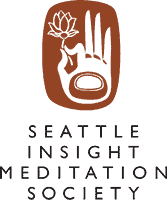See all series | See all talks
Teacher: Rodney Smith
Date: 2016-12-06
Venue: Seattle Insight Meditation Center
Description
For much of our practice history we work on faith. For the first few years we are not certain where we are going and look for visual clues, usually in other more experienced practitioners that show a reward for the spiritual work we undertake. This process keeps us leaning away from our own internal process toward those who “know” more than we do. We reason we should be more like them than the way we are. This looking outside ourselves rather than within can easily become the conditioned way we relate to our spiritual journey. Assessing where others are in relation to our own practice has no value other than ego fulfillment or diminishment, but it is a difficult philosophy to break.
After years of trying to get away from our ordinariness, we learn that we are not going to become someone special through our spiritual growth, and listening to others only leads us away from the self-discovery that is essential for deepening our journey. The journey is to understand our own mind, not externally following and imitate someone else’s mind. As we tune ourselves to ourselves, we slowly become less and less dependent upon others and more aware of the pain that leads to that dependency. We may be drawn to others who seem to emanate a clearer understanding of reality but we do not become enslaved to their truth and give away our own. The single most important power we have is to make our own decisions free of other people’s influence. To give away that function is to cast ourselves into darkness without a light to go forward.
We may think we are not moving fast enough or deeply enough, or that we are not loving or wise enough, but those assumptions are born from our ignorance, not from reality. We are not seeing beyond the film of our conditioning. The mind misses what we are by affirming what we think we are. In fact we are moving at our own unique pace. To assert our ignorance by acting on these assumptions that we are not moving fast enough is to go astray, or to become dependent upon someone else’s realization assures that we will limit our own understanding. Looking for truth in another’s words is mutually exploitive, with the teacher imposing his/her will on the students and the students forcing the teacher to maintain his/her importance.
What then should we do? We should look directly at the issues themselves and the pain that ties us to those issues. We must explore the beliefs that we are without love or wisdom. By exploring our need for dependency on others and our tendency to disbelieve ourselves, we begin to reverse that couplet and affirm our own way forward. We stay within ourselves, no matter what. Even when the Buddhist scriptures point in one direction and all our friends concur, still we examine the point thoroughly according to our own truth, through our own understanding. “This is where I am now. Maybe later I will understand that passage, but now I am here, and it is from here that I can go forward.”
Staying within ourselves when we are racked with self-doubt is difficult to do. The logic of our thinking concludes we would be better off listening to someone else. Listening to others is not the problem; the problem is listening to someone else without seeing if what they are saying is true for us as well. Taking what someone says on blind faith makes us obedient but not wise, a strong group member but not independent. What is remarkable about Buddhism is that the teaching ultimately frees us from Buddhism. We learn our way out of all religious trappings, all spiritual texts, all ritual adherence, and all the Buddha’s words and into our realized and integrated truths. We live within the stark nakedness of our life without any covering or shield, fully exposed, and fully alive.
Homework
Find your sense of self-esteem, your inward convictions and strength of character. Find that place where you are unquestionably yourself, and no one can take it from you, the place where you do not need anything from anyone. That is where we move from in dharma, nowhere else. This must be firmed up before any questions can be asked about the nature of self. How much do you waver in self-assurance and need others to confirm your decisions? Go to that pain and allow it into your heart until you can stand alone and look deeply into that aloneness without fear.
Video
Link to view on Vimeo: https://vimeo.com/195558842
TalkID=570

